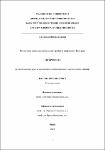I hereby declare that I will use the electronic library contents in compliance with COPYRIGHT AND RELATED RIGHTS ACT, Article 24, paragraph 1, item 9, only for scientific, cultural and educational purposes, without commercial gain, without commercial interest and non-profit.No Yes

Environmental Epidemiology of Listeria Infection in Bulgaria // Екологична епидемиология на листерийната инфекция в България

Date
2019Author
Staneva, Svetla
Станева, Светла
S.Staneva@mu-varna.bg
Metadata
Show full item recordAbstract
Listeriosis is qualified as zoonosis of increasing medical, social and economic importance because of its severe course, high mortality and specific diagnostics - serological and cultural. Pregnant women and their new-borns, people over 65 years of age and people with poor immunity are most affected. The incubation period varies from 24 hours to 70 days.
The lack of epidemiological studies in Bulgaria on listeriosis necessitates a comprehensive study and evaluation of the ecological and epidemiological system of the parasitic cycle, with the aim of offering a system of activities to improve epidemiological monitoring and control.
The development of a “Lister epidemiologic study map for patients with listeriosis” with detailed information on the nutritional factors of possible contamination can be used in the study of an epidemic outbreak of infections associated with foods. Листериозата се определя като зооноза с нарастващо медицинско, социално и икономическо значение, заради тежкото си протичане, високата смъртност и специфичната диагностика – серологична и културелна. Боледуват най-често бременни жени и техните новородени, възрастни над 65 години и хора с незадоволителен имунитет. Инкубационният период варира от 24 часа до 70 дни.
Липсата на епидемиологични изследвания в България върху листериозата, налагат комплексното изучаване и оценка на еколого-епидемиологичната система на паразитарния цикъл, с цел предлагане на система от дейности за усъвършенстване на епидемиологичния надзор и контрол.
Разработването на „Карта за епидемиологично проучване на болен от листериоза“ с подробна информация за хранителните фактори на евентуалното заразяване може да се използва при проучване на епидемичен взрив от инфекции, свързани с храна.
